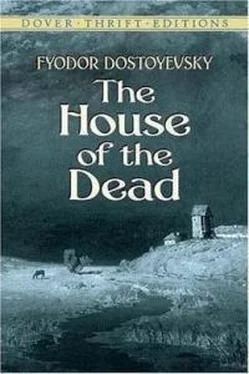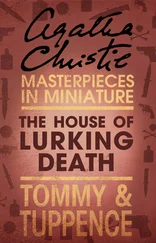Федор Достоевский - The House of the Dead
Здесь есть возможность читать онлайн «Федор Достоевский - The House of the Dead» весь текст электронной книги совершенно бесплатно (целиком полную версию без сокращений). В некоторых случаях можно слушать аудио, скачать через торрент в формате fb2 и присутствует краткое содержание. Год выпуска: 2014, Издательство: epubBooks Classics, Жанр: Русская классическая проза, на английском языке. Описание произведения, (предисловие) а так же отзывы посетителей доступны на портале библиотеки ЛибКат.
- Название:The House of the Dead
- Автор:
- Издательство:epubBooks Classics
- Жанр:
- Год:2014
- ISBN:нет данных
- Рейтинг книги:4 / 5. Голосов: 1
-
Избранное:Добавить в избранное
- Отзывы:
-
Ваша оценка:
- 80
- 1
- 2
- 3
- 4
- 5
The House of the Dead: краткое содержание, описание и аннотация
Предлагаем к чтению аннотацию, описание, краткое содержание или предисловие (зависит от того, что написал сам автор книги «The House of the Dead»). Если вы не нашли необходимую информацию о книге — напишите в комментариях, мы постараемся отыскать её.
The House of the Dead — читать онлайн бесплатно полную книгу (весь текст) целиком
Ниже представлен текст книги, разбитый по страницам. Система сохранения места последней прочитанной страницы, позволяет с удобством читать онлайн бесплатно книгу «The House of the Dead», без необходимости каждый раз заново искать на чём Вы остановились. Поставьте закладку, и сможете в любой момент перейти на страницу, на которой закончили чтение.
Интервал:
Закладка:
I spoke just now of T—ski, and have something more to say of him. When he had with his friend to leave the first place assigned to them as residence in their banishment to come to our fortress, he carried his friend B― nearly the whole way. B― was of quite a weak frame, and in bad health, and became exhausted before half of the first march was accomplished. They had first been banished to Y—gorsk, where they lived in tolerable comfort; life was much less hard there than in our fortress. But in consequence of a correspondence with the exiles in one of the other towns—a quite innocent exchange of letters—it was thought necessary to remove them to our jail to be under the more direct surveillance of the government. Until they came M—tski had been quite alone, and dreadful must have been his sufferings in that first year of his banishment.
J—ski was the old man always deep in prayer, of whom I spoke a little earlier. All the political convicts were quite young men while J—ski was at least fifty years old. He was a worthy, gentlemanlike person, if eccentric. T—ski and B—ski detested him, and never spoke to him; they insisted upon it that he was too obstinate and troublesome to put up with, and I was obliged to admit it was so. I believe that at a convict establishment—as in every place where people have to be together, whether they like it or not—people are more ready to quarrel with and detest one another than under other circumstances. Many causes contributed to the squabbles that were, unfortunately, always going on. J—ski was really disagreeable and narrow–minded; not one of those about him was on good terms with him. He and I did not come to a rupture, but we were never on a really friendly footing. I fancy that he was a strong mathematician. One day he explained to me in his half–Russian, half–Polish jargon, a system of astronomy of his own; I have been told that he had written a work upon the subject which the learned world had received with derision; I fancy his reasonings on some things had got twisted. He used to be on his knees praying for a whole day sometimes, which made the convicts respect him exceedingly during the remnant of life he had to pass there; he died under my eyes at the jail after a very trying illness. He had won the consideration of the prisoners, from the first moment of his coming in, on account of what had happened with the Major and him. When they were brought afoot from Y—gorsk to our fortress, they were not shaved on the road at all, their hair and beards had grown to great lengths when they were brought before the Major. That worthy foamed like a madman; he was wild with indignation at such infraction of discipline, though it was none of their fault.
"My God! did you ever see anything like it?" he roared; "they are vagabonds, brigands."
J—ski knew very little Russian, and fancied that he was asking them if they were brigands or vagabonds, so he answered:
"We are political prisoners, not rogues and vagabonds."
"So–o–o! You mean impudence! Clod!" howled the Major. "To the guard–house with him; a hundred strokes of the rod at once, this instant, I say!"
They gave the old man the punishment; he lay flat on the ground under the strokes without the slightest resistance, kept his hand in his teeth, and bore it all without a murmur, and without moving a muscle. B—ski and T—ski arrived at the jail as this was all going on, and M—ski was waiting for them at the principal gate, knowing that they were just coming in; he threw himself on their neck, although he had never seen them before. Utterly disgusted at the way the Major had received them, they told M—ski all about the cruel business that had just occurred. M—ski told me later that he was quite beside himself with rage when he heard it.
"I could not contain myself for passion," he said, "I shook as though with ague. I waited for J—ski at the great gate, for he would come straight that way from the guard–house after his punishment. The gate was opened, and there I saw pass before me J—ski, his lips all white and trembling, his face pale as death; he did not look at a single person, and passed through the groups of convicts assembled in the court–yard—they knew a noble had just been subjected to punishment—went into the barrack, went straight to his place, and, without a word, dropped down on his knees for prayer. The prisoners were surprised and even affected. When I saw this old man with white hairs, who had left behind him at home a wife and children, kneeling and praying after that scandalous treatment, I rushed away from the barrack, and for a couple of hours felt as if I had gone stark, staring, raving mad, or blind drunk…. From that first moment the convicts were full of deference and consideration for J—ski; what particularly pleased them, was that he did not utter a cry when undergoing the punishment."
But one must be fair and tell the truth about this sort of thing; this sad story is not an instance of what frequently occurs in the treatment by the authorities of transported noblemen, Russian or Polish; and this isolated case affords no basis for passing judgment upon that treatment. My anecdote merely shows that you may light upon a bad man anywhere and everywhere. And if it happen that such a one is in absolute command of a jail, and if he happen to have a grudge against one of the prisoners, the lot of such a one will be indeed very far from enviable. But the administrative chiefs who regulate and supervise convict labour in Siberia, and from whom subordinates take their tone as well as their orders, are careful to exercise a discriminating treatment in the case of persons of noble birth, and, in some cases, grant them special indulgences as compared with the lot of convicts of lower condition. There are obvious reasons for this; these heads of departments are nobles themselves, they know that men of that class must not be driven to extremity; cases have been known where nobles have refused to submit to corporal punishment, and flung themselves desperately on their tormentors with very grave and serious consequences indeed; moreover—and this, I think, is the leading cause of the good treatment—some time ago, thirty–five years at least, there were transported to Siberia quite a crowd of noblemen; [9] The Decembrists.
these were of such correct and irreproachable demeanour, and held themselves so high, that the heads of departments fell into the way, which they never afterwards left, of regarding criminals of noble birth and ordinary convicts in quite a different manner; and men in lower place took their cue from them.
Many of these, no doubt, were little pleased with that disposition in their superiors; such persons were pleased enough when they could do exactly as they liked in the matter, but this did not often happen, they were kept well within bounds; I have reason to be satisfied of this and I will say why. I was put in the second category, a classification of those condemned to hard labour, which was primarily and principally composed of convicts who had been serfs, under military superintendence; now this second category, or class, was much harder than the first (of the mines) or the third (manufacturing work). It was harder, not only for the nobles but for the other convicts too, because the governing and administrative methods and personnel in it were wholly military, and were pretty much the same in type as those of the convict establishments in Russia. The men in official position were severer, the general treatment more rigorous than in the two other classes; the men were never out of irons, an escort of soldiers was always present, you were always, or nearly so, within stone walls; and things were quite different in the other classes, at least so the convicts said, and there were those among them who had every reason to know. They would all have gladly gone off to the mines, which the law classified as the worst and last punishment, it was their constant dream and desire to do so. All those who had been in the Russian convict establishments spoke with horror of them, and declared that there was no hell like them, that Siberia was a paradise compared with confinement in the fortresses in Russia.
Читать дальшеИнтервал:
Закладка:
Похожие книги на «The House of the Dead»
Представляем Вашему вниманию похожие книги на «The House of the Dead» списком для выбора. Мы отобрали схожую по названию и смыслу литературу в надежде предоставить читателям больше вариантов отыскать новые, интересные, ещё непрочитанные произведения.
Обсуждение, отзывы о книге «The House of the Dead» и просто собственные мнения читателей. Оставьте ваши комментарии, напишите, что Вы думаете о произведении, его смысле или главных героях. Укажите что конкретно понравилось, а что нет, и почему Вы так считаете.












